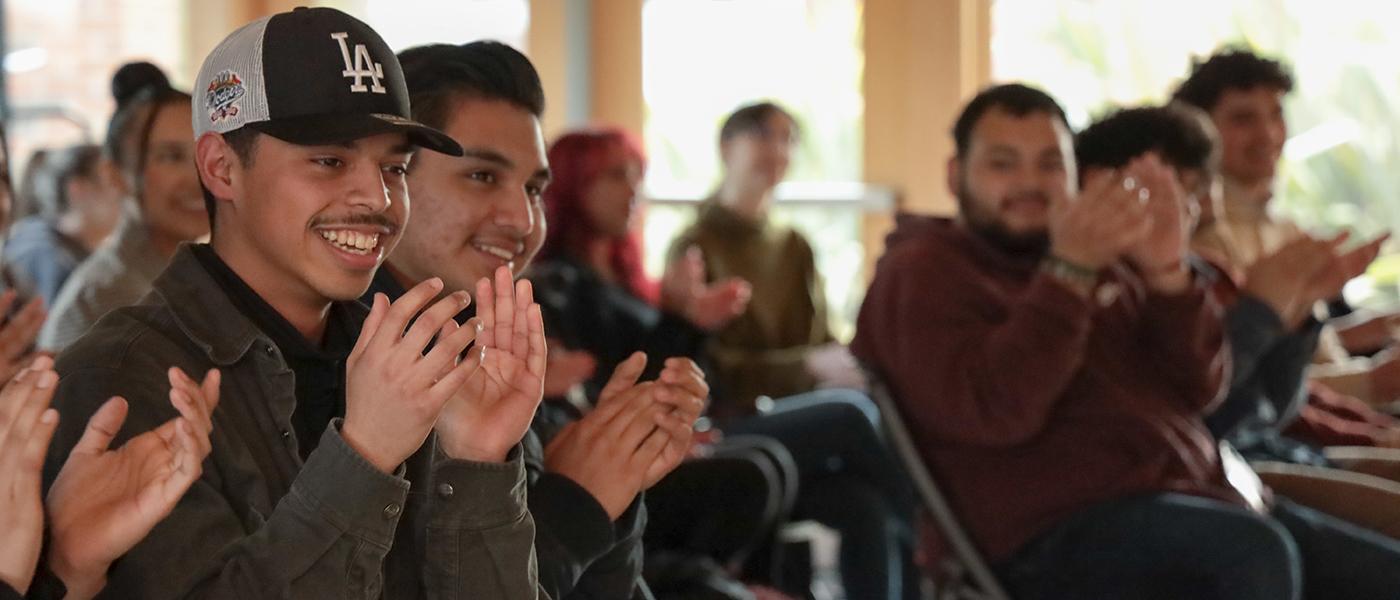Spring 2023 — Students Ismael Ochoa and Saba Moallem come from immigrant families with distinct paths to Oregon State University. But they share a strong sense of belonging and purpose, thanks in part to donor-supported student experiences through the Division of Student Affairs.
Ochoa was born in California and grew up in Hermiston after his mother moved there as a migrant worker. He is studying ethnic studies and education and wants to end the cycle of poverty experienced by many people in the migrant community. He recently attended the United States Hispanic Leadership Institute.
“I chose education because I feel like that’s the best way that I can accelerate Latino progress,” Ochoa says.
Moallem’s parents escaped religious persecution in Iran and fled to the United States. She was born in Oregon but grew up in Hong Kong. Now she’s studying computer science with a focus on artificial intelligence and is a member of Delta Sigma Theta Sorority, Inc. for women committed to public service in the Black community.
“Real accomplishment involves uplifting your community and giving back,” Moallem says. Donor gifts are providing enhanced learning and educational opportunities for Ochoa, Moallem and many more Oregon State students to achieve academic success and become leaders who will build a better future.
Progress accelerated
Ochoa participated in the College Assistance Migrant Program (CAMP), a federally funded program designed to support students from migrant and seasonal farm worker backgrounds during their first year in college. Through CAMP, Ochoa received tutoring and mentoring support, study skills guidance and development opportunities.
With donor support, he was also one of the CAMP scholars to attend the U.S. Hispanic Leadership Institute in Chicago earlier this year.
Ochoa wants to create lasting change through education and advocacy. “I so desperately want it not for myself, but for my younger brother and for future generations,” he says. “I’m very thankful for the opportunities through CAMP.”
Funding for CAMP is fixed, and without donor support, only a few students would have been able to attend the leadership conference, says María Andrade, Oregon State CAMP director. CAMP has sent students to the conference for 10 years.
“It’s been really beneficial,” Andrade says. “They’re able to see and hear from all these professionals, and there’s also the social justice piece.”
CAMP students have higher retention and graduation rates compared to the overall OSU student population, with 95% continuing after the first year of college and 81% graduating within six years.
Ochoa is finishing his second year. But he still stops by the CAMP office almost every day. Coming from a large family left a big gap that CAMP has filled.
“Leaving home and being four hours away, it really got to me. But the CAMP program was here to pick me up and remind me of my motivation,” he says. “Without that, I would probably be back in Hermiston working in factories or doing farm work, just continuing that vicious cycle.”
Finding home
Moallem has lots of friends and family who attended Oregon State. But she didn’t feel like she fit in at first. “It was a little difficult to find my group on this campus, especially since it’s a predominantly white institution,” she says.
Then in 2021, some of her friends took part in the resurgence of the Beta Psi Chapter of Delta Sigma Theta Sorority, Inc. Moallem started researching and learning about Delta Sigma Theta Sorority, Inc. The emphasis on scholarship, service and social action appealed to her. But she wasn’t sure how she would pay the dues and initiation fees.
The cost to join a fraternity or sorority can be a barrier for historically underrepresented students. To increase participation, the Division of Student Affairs used gifts to the Student Affairs Student Success Fund for the National Pan-Hellenic Council to award two scholarships covering the membership fees for Moallem and another sorority member this academic year.
“Receiving this scholarship allowed me to join this illustrious sisterhood,” she says. “Without it, I would have struggled.”
Instead, she’s stayed focused on finishing her degree in 2024 and is pursuing other interests, including photography, and starting a decorative paddle-making business.
Joining Delta Sigma Theta Sorority, Inc. contributed to Moallem’s sense of belonging. She runs social media for her sorority and OSU’s National Pan-Hellenic Council, as well as other student clubs. And she’s networking with members of the alumnae chapter in Portland and other women she’s met through the Beta Psi Chapter.
“I have thousands of sorority sisters all around the globe,” she says. “I feel like wherever I go, I have somewhere to call home.”
Photo: Ismael Ochoa (third to right, front row) claps as students who attended the U.S. Hispanic Leadership Institute share their experiences at an OSU event.
